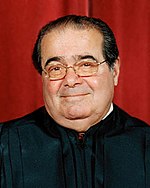| Type | Case | Citation | Issues | Joined by | Other opinions |
|---|
401
| Oregon v. Ice | 555 U.S. 160 (2009)
| Sixth Amendment • right to jury trial • imposition of consecutive sentences for multiple offenses | Roberts, Souter, Thomas | |
|
202
| Pleasant Grove City v. Summum | 555 U.S. 460 (2009)
| First Amendment • free speech • government speech • public forums | Thomas | |
|
103
| Summers v. Earth Island Institute | 555 U.S. 488 (2009)
| Forest Service Decisionmaking and Appeals Reform Act • regulatory exceptions to notice and comment procedures • Article III • standing | Roberts, Kennedy, Thomas, Alito | |
|
204
| Negusie v. Holder | 555 U.S. 511 (2009)
| immigration law • Refugee Act of 1980 • persecutor bar for refugee applicants | Alito | |
|
405
| Marlowe v. United States | 555 U.S. 963 (2008)
| Sixth Amendment • right to trial by jury • United States Sentencing Guidelines | | |
| Scalia dissented from the Court's denial of certiorari. |
406
| Sorich v. United States | 555 U.S. 1204 (2009)
| honest services fraud | | |
| Scalia dissented from the Court's denial of certiorari. |
107
| Puckett v. United States | 556 U.S. 129 (2009)
| Federal Rules of Criminal Procedure • plain-error standard for unpreserved claims of error • breach of plea agreement | Roberts, Kennedy, Thomas, Ginsburg, Breyer, Alito | |
|
308
| Harbison v. Bell | 556 U.S. 180 (2009)
| federally appointed counsel in state clemency proceedings • certificate of appealability | | |
|
109
| Entergy Corp. v. Riverkeeper, Inc. | 556 U.S. 208 (2009)
| Clean Water Act • environmental impact of power plant cooling water intake • national performance standards based on cost-benefit analysis | Roberts, Kennedy, Thomas, Alito | |
|
110
| United States v. Navajo Nation | 556 U.S. 287 (2009)
| Navajo Nation • Navajo-Hopi Rehabilitation Act of 1950 • Surface Mining Control and Reclamation Act of 1977 • failure of Secretary of Interior to promptly approve tribal coal lease royalty rate increase | Unanimous | |
|
211
| Arizona v. Gant | 556 U.S. 332 (2009)
| Fourth Amendment • search incident to arrest • vehicle search | | |
|
112
| FCC v. Fox Television Stations, Inc. | 556 U.S. 502 (2009)
| Public Telecommunications Act of 1992 • indecency ban on broadcast television • fleeting expletives | Roberts, Thomas, Alito; Kennedy (in part) | |
|
113
| Kansas v. Ventris | 556 U.S. 586 (2009)
| Sixth Amendment • admissibility of unconstitutionally elicited statement as impeachment evidence | Roberts, Kennedy, Souter, Thomas, Breyer, Alito | |
|
114
| Arthur Andersen LLP v. Carlisle | 556 U.S. 624 (2009)
| Federal Arbitration Act • appealability of order denying stay of arbitrable action | Kennedy, Thomas, Ginsburg, Breyer, Alito | |
|
215
| Carlsbad Technology, Inc. v. HIF Bio, Inc. | 556 U.S. 635 (2009)
| appeal after removal to state court • supplemental jurisdiction | | |
|
216
| Flores-Figueroa v. United States | 556 U.S. 646 (2009)
| federal criminal law • identity theft • knowing use of another person's identification | Thomas | |
|
117
| Montejo v. Louisiana | 556 U.S. 778 (2009)
| Fifth Amendment • right against self-incrimination • police interrogation after invocation of right to counsel | Roberts, Kennedy, Thomas, Alito | |
|
118
| Republic of Iraq v. Beaty | 556 U.S. 848 (2009)
| Iraq–United States relations • Foreign Sovereign Immunities Act of 1976 • Emergency Wartime Supplemental Appropriations Act • state-sponsored terrorism | Unanimous | |
|
419
| Caperton v. A. T. Massey Coal Co. | 556 U.S. 868 (2009)
| Due Process Clause • recusal • judicial campaign contributions from litigant | | |
|
420
| Yeager v. United States | 557 U.S. 110 (2009)
| Double Jeopardy Clause • issue preclusion • inconsistency between acquittal and hung jury | Thomas, Alito | |
|
221
| Coeur Alaska, Inc. v. Southeast Alaska Conservation Council | 557 U.S. 261 (2009)
| Clean Water Act • Army Corps of Engineers authority to issue slurry discharge permit | | |
|
122
| Melendez-Diaz v. Massachusetts | 557 U.S. 305 (2009)
| Sixth Amendment • Confrontation Clause • forensic analyst affidavits | Stevens, Souter, Thomas, Ginsburg | |
|
123
| Cuomo v. Clearing House Assn., L. L. C. | 557 U.S. 519 (2009)
| National Banking Act • fair-lending laws • federal preemption | Stevens, Souter, Ginsburg, Breyer | |
|
224
| Ricci v. DeStefano | 557 U.S. 557 (2009)
| Title VII • disparate impact • exams used for employee promotions | | |
|
425
| In re Davis | 557 U.S. 952 (2009)
| habeas corpus | Thomas | |
| Scalia dissented from the Court's order that a district court hear and determine a habeas corpus petition. |
